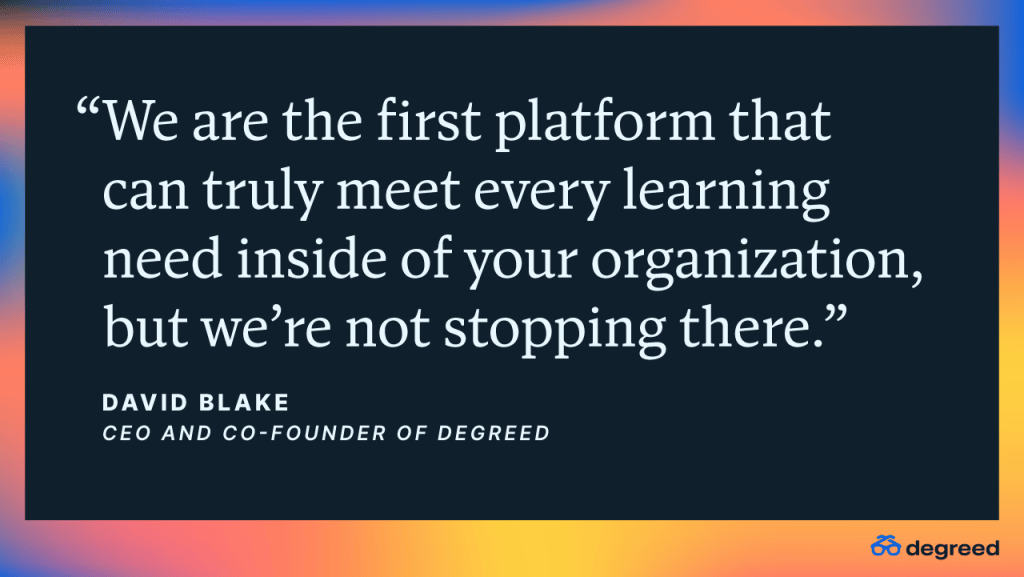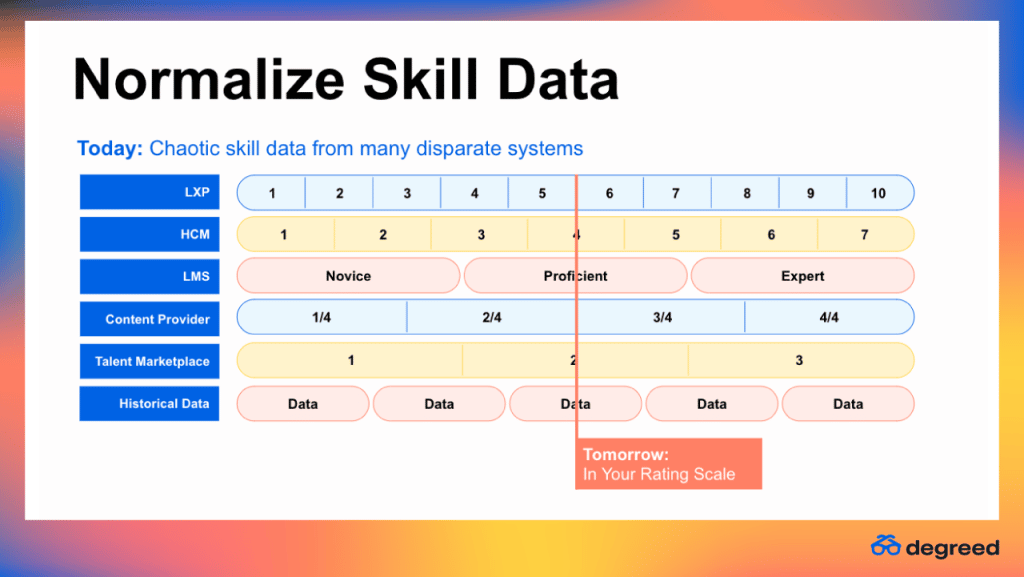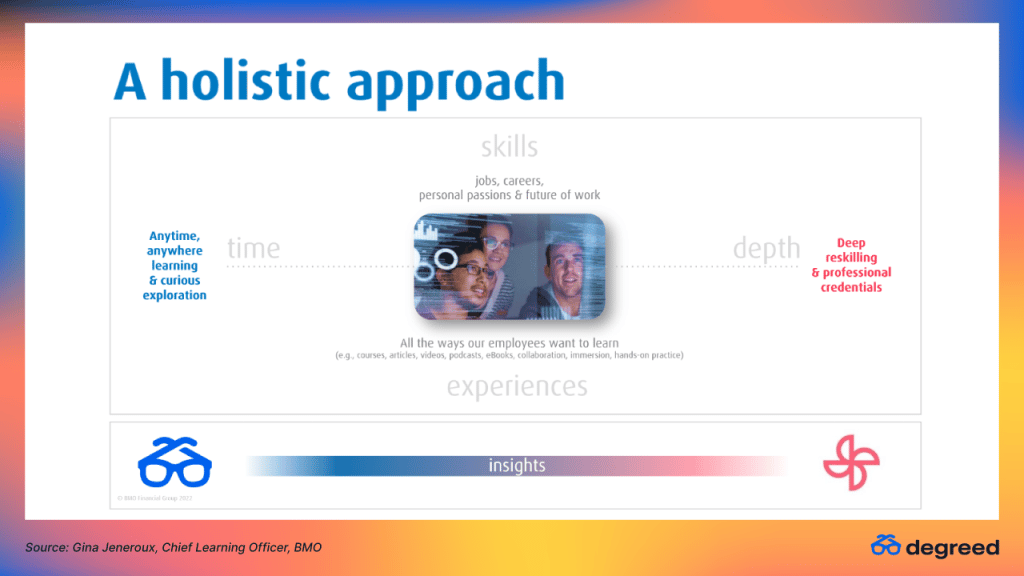Learning requires more than just a learning experience platform. Full stop. We’re not afraid to say it. We have and will always advocate for learning by choice, and we became the first LXP by necessity.
But the world of work needs something more, and we’re ready.
“We are the first platform that can truly meet every learning need inside of your organization, but we’re not stopping there,” David Blake, Degreed Founder and CEO, said at our latest Vision event.
Ushering in a New Decade of Learning
In 2012, informative content was everywhere. And not in a good way. Picture a giant warehouse with paper and boxes stacked ceiling high; the overwhelming amount of learning content was the internet equivalent – disorganized, unruly and borderline unusable. Blake saw this challenge unfold and used his passion for education and learning reform to create an opportunity.
“The world of content exploded. Degreed responded by bringing it together in the learning experience platform,” Blake said.
Flash forward 10 years to 2022: Degreed is more mature. We’re bigger. But we’ve still got the same passion for lifelong learning, the same zest for innovation and problem-solving, and — in a serendipitous turn of events — the same CEO. What we did to compile, organize and track content, we now intend to do for skill data.

Why skill data?
People build and use their skills. Companies rely on their people’s skill sets to drive business outcomes. Skills are at the intersection of people and business, which makes skill data the common language and thread needed to intertwine the two. This overlap is becoming integral to any organization that wants fulfilled people and achieved business goals.
“We now exist in a world where the skills gap is growing faster than humanity can learn,” Blake said. “That leaves us in a world where you can no longer expect to hire all the skills that you need. It means we exist in a future where you will have to develop the skills to meet your needs.”
To effectively develop your people’s careers, you need hard numbers on what skills your workforce has across your company and what skills it needs. And right now, there’s a good chance that it’s a mess. That your data is spread across multiple siloed platforms with little to no consistency. That even if you brought that data together, a lack of standardization would make it meaningless and chaotic.
We plan to update our system to compile all this data and, as Blake said best, “give it back to you in your own language.” Making skill data a common language will bring learning and business results closer together than ever.
So how do we get there? Our actions today drive business outcomes you’ll see tomorrow.
What is Degreed doing next?
We’re focusing on three distinct tasks:
- Advancing the Utility of Learning Data and Skills Insights
Currently, learning and talent tech is complex. Data can come from HCMs, LMSs, LXPs, content providers or any number of other platforms. And how each measures and assesses skill levels differs — where one says “proficient” another might say “five” and one might say “incomplete.”
We’ll be simplifying these systems to give you actionable insights, as David Blake said, “in your own language.”

A big innovation like skill data standardization is a goal that will take us time to reach, but you can already see some of the steps we’re taking right now. One of which includes diversifying our ecosystem so all your favorite systems can aggregate in one place—Degreed.
- Strengthening a Connected Ecosystem
For Degreed to become your hub for data, our external partnerships need to include an assortment of popular data sources. We took a few large steps toward expanding our partnerships in 2022 by developing integrations with organizations including Eightfold, Phenom, SAP and Workday to name a few.
These partnerships help us join forces with a wide variety of talent marketplaces, content providers, HCMs and more — to benefit your business. And, in typical Degreed fashion, we have no intention of stopping there.
You continue collecting the data where and how you see fit, and we’ll meet you there to turn what you already have into statistics that would be any decision maker’s dream.
- Activating Workforce Learning
To activate workforce learning, you’ll need tools and strategies that are as nimble as your organization has to be. Manual work in technology is the enemy of agility. That’s why one area you can expect more automation is group segmentation. Your workforce is dynamic, so we want to make sure your controls and workflows can keep up.
“People and their roles change all the time and maintaining those groups every time change happens is painful,” Nag Chandrashekar, Chief Product Officer at Degreed, said.
Instead of establishing and maintaining hundreds of admin groups, you’ll be able to assign people to roles, skills and groups with a simple, intuitive rule builder. This shift means systems managers can improve personalization while reducing time and effort.
“Personalization is critical for driving more engagement,” Chandrashekar said.
But this automation isn’t the only way to drive more engagement. We plan to eliminate the need for L&D teams to send manual engagement reminders via chat and email. Instead, this time-consuming task will be replaced by automated nudges and campaigns sent from inside Degreed.
Along the way, you can also expect enhancements to content creation, curation, searching and hosting. For example, you can anticipate a redesign to make Plans and Pathways faster and easier to create by minimizing publication decisions and requirements. We want to make content creation as seamless and customizable as possible. One step we’ve already taken is improving search functionality so your people spend less time searching and more time learning.
Deeper Learning Experiences
Our pending acquisition of Learn In can herald a final piece of the puzzle. The platform takes a learner from A to B in terms of measurable skill-building outcomes. In contrast to the day-to-day learning Degreed offers, Learn In compiles access to certifications, long-term and in-depth courses, customizable company-specific academies, flexible educational benefit options and more.
This unique addition to our learning ecosystem offerings would further each of our three key focuses: The Degreed and Learn In integration would simplify your learning ecosystem by uniting daily learning with deep skill-building, provide more easy-to-use learning options, and help automate content curation and educational benefits.
What does comprehensive learning look like today?
The future is ripe with opportunities, but how learning is executed today plays a significant role in what’s to come. So, what does it look like to use Degreed and Learn In right now?
Using Degreed and Learn In together means an even greater focus on learning opportunities, employee engagement and agility.
“You can’t predict everything that might happen, but if you’re able to help your employees be nimble, be curious, continue to learn all the time and be able to jump in to build their own skill sets… then it helps not only them but the organization, your clients and society be ready for the work world that we’re facing for tomorrow,” said Chief Learning Officer Gina Jeneroux from the Bank of Montreal (BMO) Financial Group, a Degreed and Learn In client.
With this in mind, BMO sought anywhere, anytime learning to encourage curiosity among its people — which led them to Degreed. From there, the BMO team needed depth to ensure skill-building was thorough and significant, which they gained from Learn In.
Through this combination, BMO encompassed the entire spectrum of learning and skill-building opportunities, all while collecting data and insights to better inform talent decisions.

As Blake has said, the future doesn’t care how or where you upskilled, just that you did. It’s up to all of us as L&D professionals to shape learning to fit the needs of our modern businesses and drive meaningful results.
We’ll always reach for the moon, but we can’t get there without you.
“We want the world to be able to learn everywhere, all the time,” Blake said, “and to have all of it count and mean something.”
Learn More About Degreed
Creating a positive learning culture can be a huge undertaking, but the time and effort can reward your organization with improved employee engagement, a growing inventory of skill data and a more experienced workforce.

We’d love to chat with you about your L&D strategy and how Degreed can help.
This blog post was updated on 11/21/2022 with new information and content. The original post was published on 11/17/2022.
